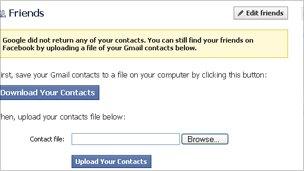Facebook and Google in data sharing spat
- Published

Facebook has added a button in defiance of Google's data ban
Facebook has responded to Google's decision to block the export of contact information from Gmail by offering users a work-around solution.
It has added a link, allowing users to first move their Gmail contacts to a PC and then upload them to Facebook.
Google stopped this process happening automatically, because it said Facebook did not share its data reciprocally.
Google said it was "disappointed" with the site's actions, whilst Facebook declined to comment.
"We're disappointed that Facebook didn't invest their time in making it possible for their users to get their contacts out of Facebook," a Google Spokesperson said.
"As passionate believers that people should be able to control the data they create, we will continue to allow our users to export their Google contacts."
Social advantage
The row has put the rivalry between the two firms in the spotlight.
Increasingly firms are making it easier for users to move their data around the web and from device to device.
Data-rich Facebook, with 500 million users, is one of the most sought-after sources of information.
But it has been selective about who it will share data with.
While it has struck a deal with Microsoft to allow user data to power its Bing search engine, it has made no such arrangement with rival Google.
Mike Davis, a senior analyst with research firm Ovum, thinks the latest stand-off says a lot about the developing rivalry between the two firms.
"Facebook is a significant challenge to Google's dominance of the web sphere and it has decided that it doesn't want to give Facebook any more advantage.
"This is Google waking up to the fact that it was the next big thing and that now Facebook is," he said.
"Its 500 million contacts and links are absolute nirvana for advertising executives and Facebook is a lot closer to its customers. Google is probably the biggest data repository in the world but it doesn't have that all important social interaction," he added.
While a work-around solution to uploading Gmail contacts might be a cheeky response to Google, Mr Davis is not sure it will wash with all Facebook users.
"People want social interaction to be easy. Exposing what you are doing could make some people question whether they want to do it," he said.
- Published8 November 2010
- Published3 November 2010